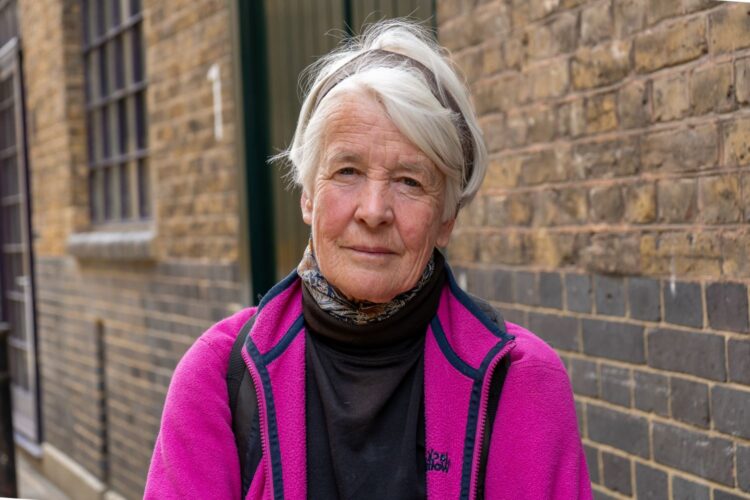By Charlotte Webster-
A retired social worker, Trudi Warner,(pictured) is facing contempt of court charges that could keep her in prison after she held up a placard outside Inner London crown court earlier this year, expressing support for the rights of jurors.
Warner’s case has gained significant attention after it was revealed that at least 12 people are currently under police investigation for suspected attempts to pervert the course of justice due to similar actions outside a London court.
The investigation, led by the public order crime unit, is still in its early stages.
The controversy surrounding these cases centers on the restrictions imposed by a judge on defendants involved in climate trials.
These restrictions prevent defendants from mentioning climate change, insulation, fuel poverty, or their motivations for taking action during their trials.
Such limitations have raised concerns among civil rights groups, with Liberty labeling them as “deeply concerning.”
Individuals who have defied these restrictions have faced contempt of court charges, resulting in some being sentenced to jail.
Among them are Amy Pritchard and Giovanna Lewis, both of whom received seven-week jail terms for ignoring the judge’s ruling not to mention climate change during their jury addresses. They are currently appealing against their contempt of court convictions.
Trudi Warner, who attended some of these trials as a witness, took her protest outside Inner London crown court, displaying a sign that read, “Jurors: you have an absolute right to acquit a defendant according to your conscience.” Subsequently, she was committed to the Old Bailey for contempt of court proceedings.
The case was referred to Michael Tomlinson KC, the solicitor general and a Conservative MP for Mid Dorset and North Poole, to decide whether to pursue contempt proceedings or charge her with attempting to pervert the course of justice.
Last Thursday, Tomlinson wrote to Warner, confirming that he had chosen to prosecute her for contempt of court, which will be heard in the high court.
The broader investigation into individuals who held placards with similar messages outside Inner London crown court in May is ongoing.
The investigation was initiated after Judge Silas Reid referred 24 people to the attorney general earlier this summer for their protest actions. The protesters had displayed placards reading, “Jurors have an absolute right to acquit a defendant according to their conscience.”
Tim Crosland, a lawyer who is among those being investigated, commented on the situation, saying, “It’s surreal. On the one hand, it’s terrifying because that is the situation in this country at the moment, and on the other hand, I feel like we are revealing something truthful about the situation, the extreme repression that is happening in this country at the moment.”
Scotland Yard confirmed that an investigation into alleged attempts to pervert the course of justice related to these protests is underway but clarified that no arrests have been made.
The attorney general’s Office emphasized that the decision to issue contempt proceedings is used sparingly and based on the assessment of whether there is a real risk of interference with the administration of justice and if it is in the public interest.
They further confirmed that the solicitor general had determined to institute proceedings against Trudi Warner in the public interest, with the court now set to consider the case.
These developments highlight the complex interplay between the right to protest and the boundaries set by the courts.
While individuals have the right to express their views, especially in matters of conscience, the legal system also seeks to uphold the sanctity of court proceedings, which includes safeguarding the impartiality of jurors.
The cases of Trudi Warner and others could provoke discussions on the balance between these fundamental principles in the realm of civil protest, but the order of a judge is never to be broken.
The Attorney General has taking a strong stance to establish a necessary precedent that there are consequences for violating the orders of judge.




